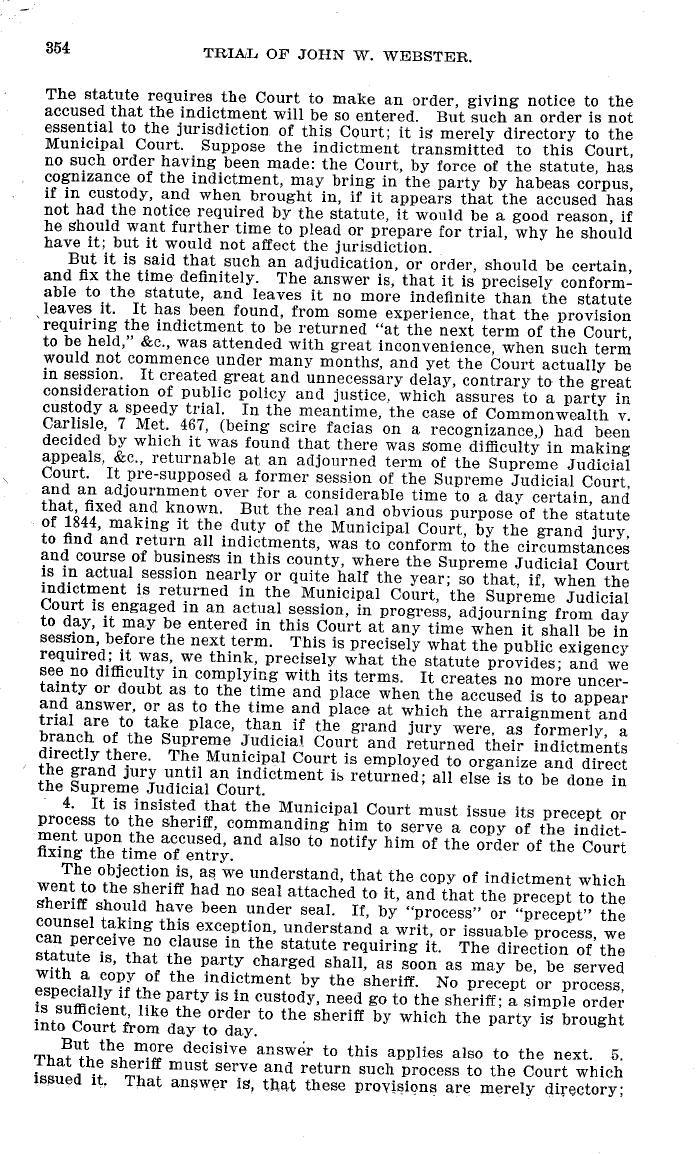|
354 TRIAL OF JOHN W. WEBSTER.
The statute requires the Court to make an order, giving notice to the
accused that the indictment will be so entered. But such an order is not
essential to the jurisdiction of this Court; it is merely directory to the
Municipal Court. Suppose the indictment transmitted to this Court,
no such order having been made: the Court, by force of the statute, has
cognizance of the indictment, may bring in the party by habeas corpus,
if in custody, and when brought in, if it appears that the accused has
not had the notice required by the statute, it would be a good reason, if
he should want further time to plead or prepare for trial, why he should
have it; but it would not affect the jurisdiction.
But it is said that such an adjudication, or order, should be certain,
and fix the time definitely. The answer is, that it is precisely conform-
able to the statute, and leaves it no more indefinite than the statute
leaves it. It has been found from some experience, that the provision
requiring the indictment to be returned "at the next term of the Court,
to be held," &c., was attended with great inconvenience, when such term
would not commence under many months, and yet the Court actually be
in session. It created great and unnecessary delay, contrary to the great
consideration of public policy and justice, which assures to a party in
custody a speedy trial. In the meantime, the case of Commonwealth v.
Carlisle, 7 Met. 467, (being scire facias on a recognizance,) had been
decided by which it was found that there was some difficulty in making
appeals, &c., returnable at an adjourned term of the Supreme Judicial
Court. It pre-supposed a former session of the Supreme Judicial Court,
and an adjournment over for a considerable time to a day certain, and
that, fixed and known. But the real and obvious purpose of the statute
of 1844, making it the duty of the Municipal Court, by the grand jury,
to find and return all indictments, was to conform to the circumstances
and course of business in this county, where the Supreme Judicial Court
is in actual session nearly or quite half the year; so that, if, when the
indictment is returned in the Municipal Court, the Supreme Judicial
Court is engaged in an actual session, in progress, adjourning from day
to day, it may be entered in this Court at any time when it shall be in
session before the next term. This. is precisely what the public exigency
required; it was, we think, precisely what the statute provides; and we
see no difficulty in complying with its terms. It creates no more uncer-
tainty or doubt as to the time and place when the accused is to appear
and answer, or as to the time and place at which the arraignment and
trial are to take place, than if the grand jury were, as formerly, a
branch of the Supreme Judicial Court and returned their indictments
directly there. The Municipal Court is employed to organize and direct
the grand jury until an indictment is returned; all else is to be done in
the Supreme Judicial Court.
4. It is insisted that the Municipal Court must issue its precept or
process to the sheriff, commanding him to serve a copy of the indict-
ment upon the accused, and also to notify him of the order of the Court
fixing the time of entry.
The objection is as we understand, that the copy of indictment which
went to the sheriff had no seal attached to it, and that the precept to the
sheriff should have been under seal. If, by "process" or "precept" the
counsel taking this exception, understand a writ, or issuable process, we
can perceive no clause in the statute requiring it. The direction of the
statute is, that the party charged shall, as soon as may be, be served
with a copy of the indictment by the sheriff. No precept or process,
especially if the party is in custody, need go to the sheriff; a simple
order
is sufficient like the order to the sheriff by which the party is brought
into Court from day to day.
But the more decisive answer to this applies also to the next. 5.
That the sheriff must serve and return such process to the Court which
issued it. That answer is, that these provisions are merely directory;
|

